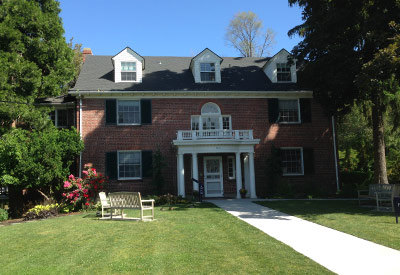Campus Map
To download a PDF version of the map, click here.

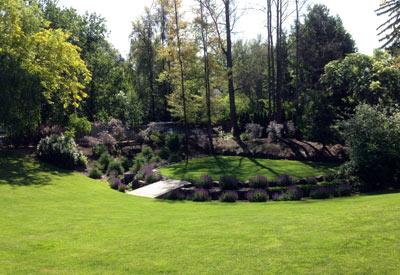
The outdoor amphitheatre is used for theater and music performances and is also a wonderful place for studying or quiet reflection.
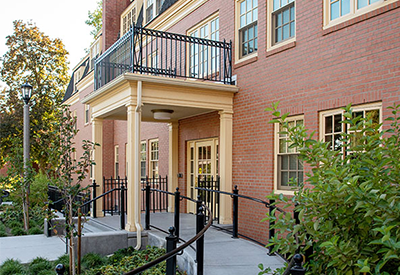
Anderson Hall is a residence hall primarily for first-year students, and features a large central lounge with floor-to-ceiling windows, a fireplace and a big backyard complete with a sand volleyball court.
Audio Description
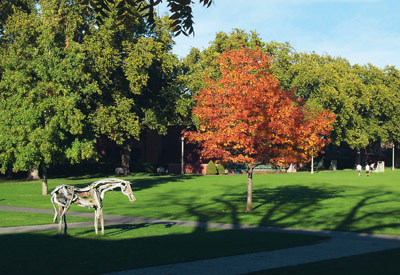
Ankeny Field is a central gathering place on campus that is used as a sporting field and a place to study and hang out with friends.
Audio Description
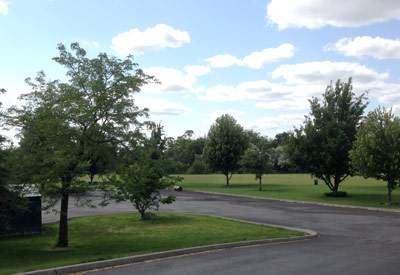
The Athletics Fields are located about three blocks north of Whitman’s campus, next to DeSales High School and at the end of Penrose Street. In 2023, the college added James Hayner Field, comprised of FieldTurf CORE, the only FIFA-approved artifical turf, which minimizes the risk of injury.
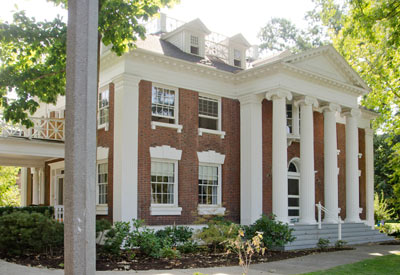
The colonial-style Baker Center was built in 1904 for Mabel Ida Baker Anderson and Louis Anderson, a professor of Greek and Latin who was one of the first three faculty members at Whitman College. Baker Center is home to the Alumni Relations and Annual Giving offices.
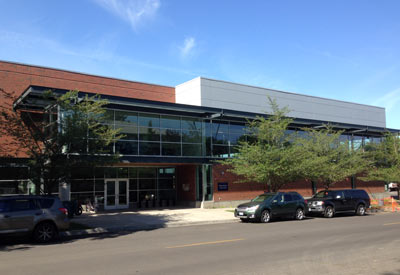
The Baker Ferguson Fitness Center was designed to meet the personal fitness needs of the Whitman College community. Located in the heart of campus, the center also includes Harvey Pool, home to the men’s and women’s swimming teams. The facility is open to Whitman students, alumni, faculty and staff members.
Audio Description
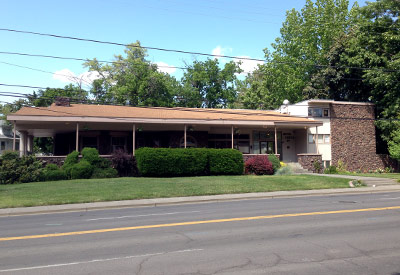
Whitman College’s Gamma Zeta chapter of the Beta Theta Pi fraternity was founded in 1916. The members of the chapter adhere to the mission of Beta Theta Pi and the motto, “Cooperation Makes Strength.”
More Information
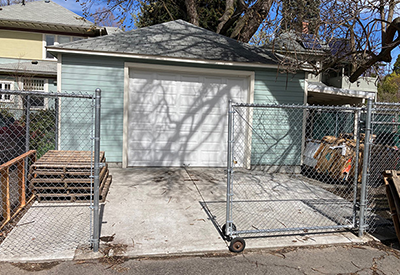
The Outdoor Program Bike Shop offers reasonably priced bike maintenance and repairs, mountain bikes for rent, and a small variety of retail merchandise, including bike tubes, lights, locks and bags. The Bike Shop is located in the alley directly behind the French House and the Outhouse special interest houses, next to the cardboard recycling on Merriam Street by the Health Center.
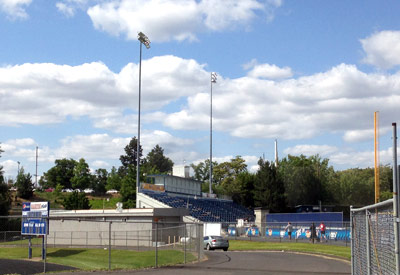
The 2,200-seat capacity Borleske Stadium, named for legendary athlete and coach Raymond V. Borleske ’10, is home to the Whitman College men's baseball team, the Blues, and also home to the Walla Walla Sweets, a local West Coast League summer collegiate baseball team.
The Bracher Observatory, which is 9 miles north of town on Erickson Farm, has a 16-inch Newtonian telescope.
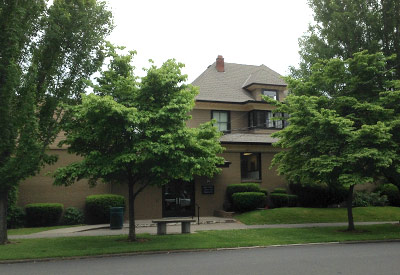
Boyer House contains Printing Services, Mailing Services and the Office of Communications.
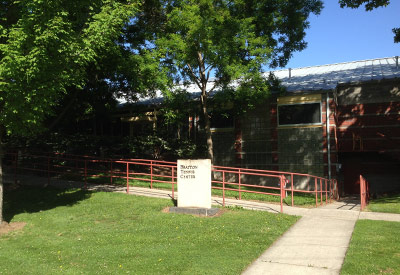
The Bratton Indoor Tennis Center is named in honor of former Whitman College president Walter A. Bratton. The 28,000-square-foot masonry building houses four indoor courts and is home to Whitman’s men’s and women’s varsity tennis teams.
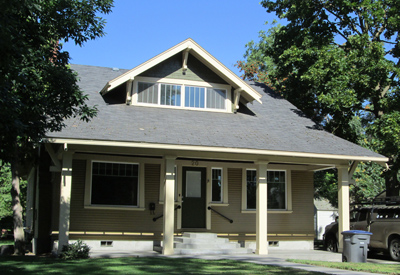
The Chinese Language and Culture House (华文苑) was originally called the Asian Studies House. The house has five bedrooms that can comfortably host an average of six to seven residents, one resident assistant and a language assistant. The Chinese House collaborates with the Chinese Department and is assigned an adviser from the department.
More Information
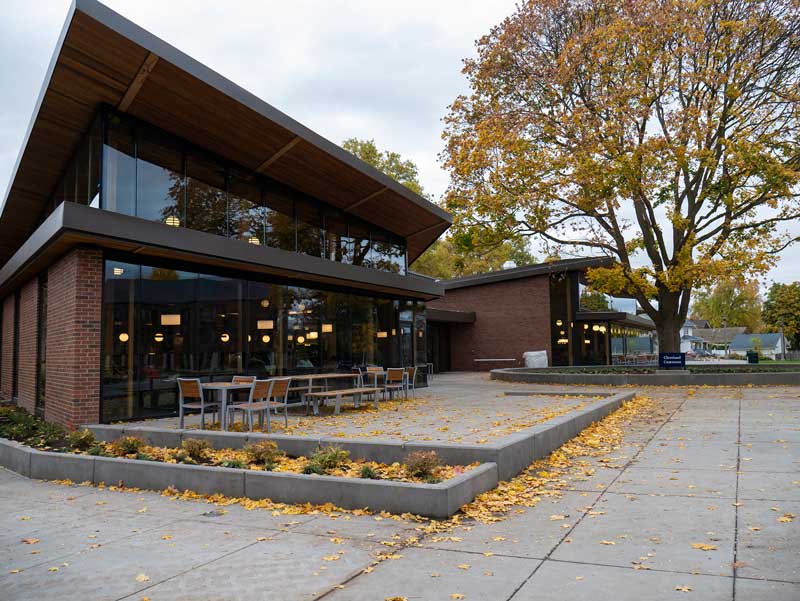
Cleveland Commons, a 500-seat dining hall operated by Bon Appétit, serves the entire campus community and is open to the public. Named after longtime Dean of Students Chuck Cleveland, the facility features a variety of dining stations, including pizza, sushi, noodles, comfort food, global cuisine, a deli, soups, salad bar and more.
Audio Description
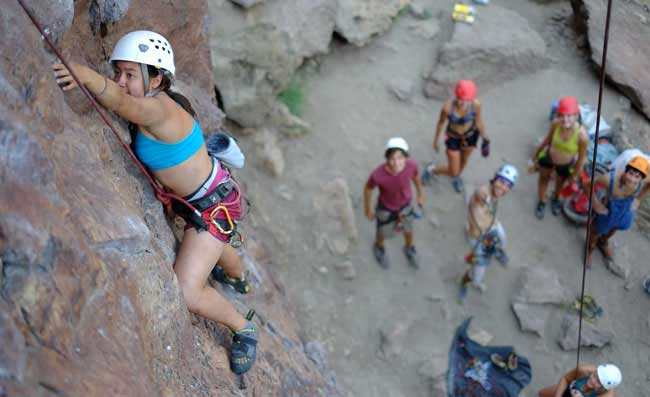
On the south side of the Sherwood Athletic Center, you’ll find the Whitman College Climbing Center. The custom-designed main wall is over 100 feet long and 32 feet high. There is a bouldering area with overhangs and more. The facility is fully enclosed and was designed by the same company that built REI’s Pinnacle Climbing Wall in Seattle.
Audio Description

College House is a residence hall available to sophomores, juniors and seniors. It has a capacity of about 35 students, with furnished double, triple, quad and six-person apartment options.
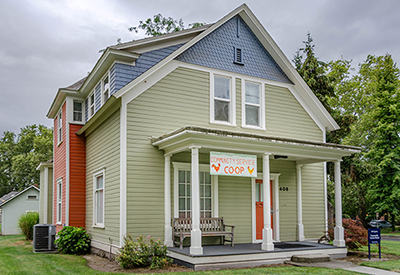
The Community Service House focuses on promoting community service to Whitman students. The house has six rooms and can house up to seven residents and one resident assistant.
More Information
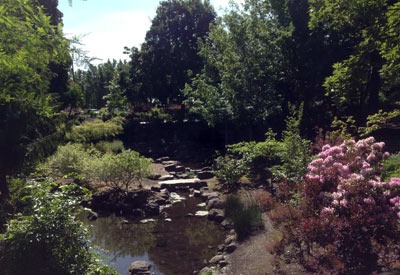
A beautiful, park-like location along College Creek near Penrose House. Also referred to as “Narnia.”
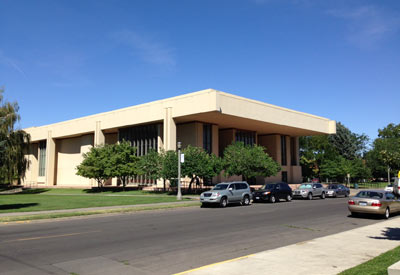
With a capacity of 1,350, Cordiner Hall is the largest event space on the Whitman College campus. The building is used for college ceremonies as well as live musical and theatrical performances (see upcoming schedule of events).
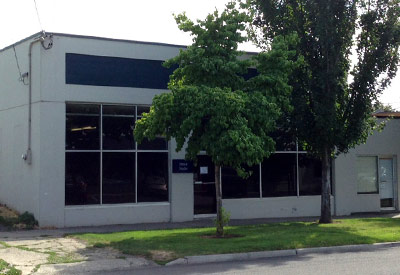
The Dance Studio serves as both a classroom and a performance space for Whitman’s Dance program.
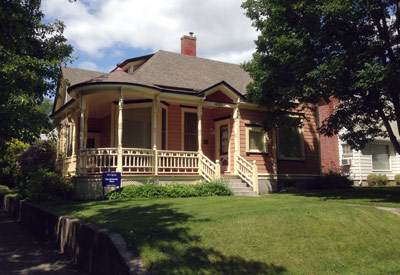
Das Deutsche Haus (The German House) has five bedrooms and can comfortably house six residents and one resident assistant. This house focuses on hosting German culture and language-oriented events. Das Haus is affiliated with, and is assigned an advisor from, the German Studies Department.
More Information
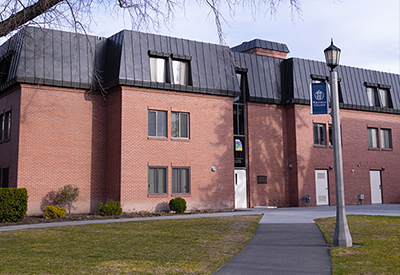
Named for Supreme Court justice and Whitman alum William O. Douglas, Douglas Hall is a residence hall for sophomores, juniors and seniors. The hall features 10 single rooms and nine suites which house eight students each. Each suite has two bathrooms, a kitchenette, lounge and laundry facilities.
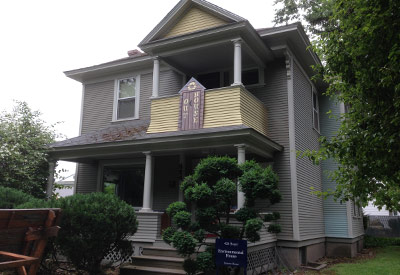
The Environmental House, more commonly known as the “Outhouse,” has six bedrooms and houses an average of eight residents and one resident assistant. The Outhouse focuses on environmental and ecological issues and spearheads the campus’ recycling program. The Outhouse is affiliated with the Environmental Studies Department and collaborates with an advisor from that department.
More Information
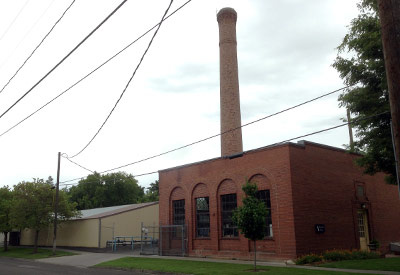
Facilities Services, formerly known as Physical Plant Services, is located on the north end of campus. Facilities is responsible for keeping Whitman College working efficiently—from cutting the grass to fixing the heating system, painting the walls to vacuuming the residence halls, and repairing vehicles.
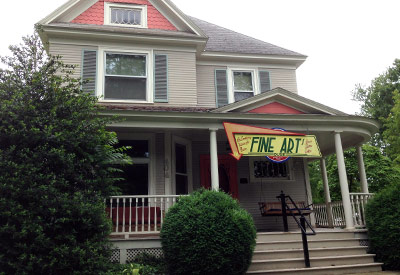
The Fine Arts House has four bedrooms and comfortably houses an average of six residents and one resident assistant. Residents work to promote programs emphasizing studio art, theater and music. The Fine Arts House is affiliated with the Art Department and is assigned an adviser from that department.
More Information
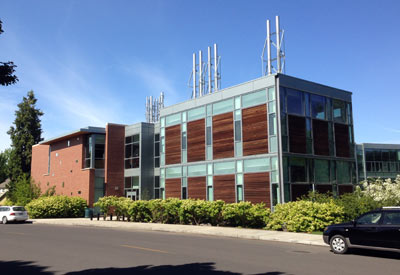
The Fouts Center for Visual Arts is a 38,000-square-foot facility that provides space for the college’s visual arts program. Fouts has studio space for different disciplines, a digital arts lab, student studio spaces, and a gallery where student work is often exhibited.
Audio Description
More Information
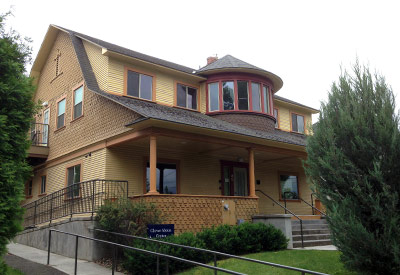
The Glover Alston Intercultural Center (GAIC, “the gack”) is a space that fosters intercultural awareness, inclusiveness and respect for all. The space coordinates several equity programs and works to support students in navigating potential structural barriers to success through individualized guidance and resources.

The Hall of Music, home of the Music Department, features Chism Recital Hall, a 300-seat performance space, as well as a listening center, an electronic music studio, 14 teaching studios and 25 practice rooms.
Audio Description
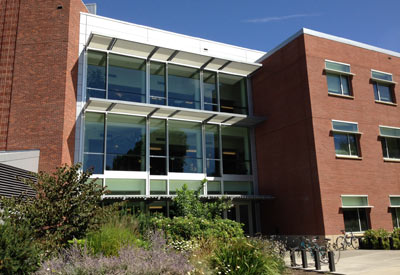
The Hall of Science houses many science departments, classrooms, a rooftop astronomy observation lab, a greenhouse, Brattain Auditorium, Clise Planetarium, and the STEM Hub.
Audio Description
More Information
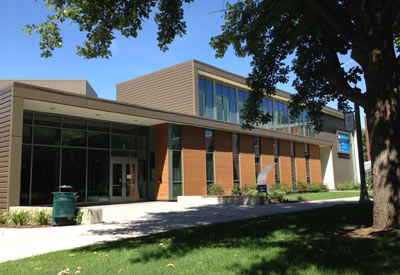
The Harper Joy Theatre is home to the 310-seat Alexander Stage, the Freimann Studio Theatre, an acting studio, a scene shop, a design classroom with computer lab, and a costume shop.
Audio Description
More Information

Hunter Conservatory houses the Film & Media Studies Department and includes the 75-seat Kimball Theatre.
Audio Description
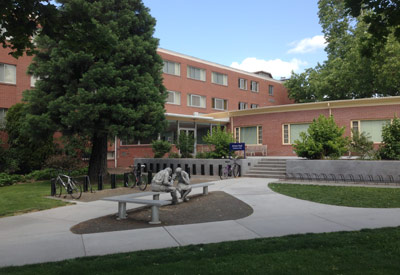
Jewett Hall is a traditional residence hall which houses nearly 170 first-year students. It has spacious lounges with kitchen space, a recreation room, a free laundry room, and Jewett Café, serving grab-and-go meals, breakfast and lunch.
Audio Description
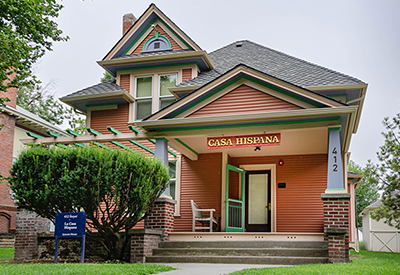
La Casa Hispana (The Spanish House) has five bedrooms and houses an average of seven residents and one resident assistant. La Casa Hispana is affiliated with, and is assigned an advisor from, the Hispanic Studies Department.
More Information
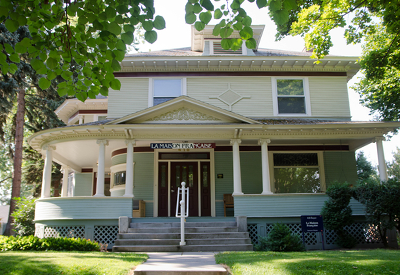
La Maison (The French House) has seven bedrooms and comfortably houses an average of eight to nine residents and one resident assistant. La Maison is affiliated with, and works with a faculty advisor from, the French and Francophone Studies Department.
More Information
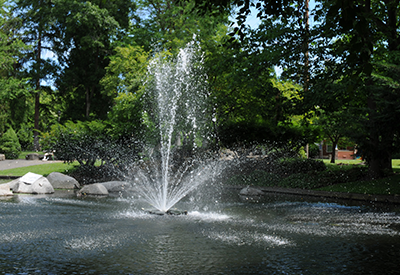
Lakum Duckum is a pond which is heated by a nearby geothermal spring, located on the south side of Maxey Hall and the outdoor tennis courts. Stone benches provide a peaceful place to relax or study.
Audio Description
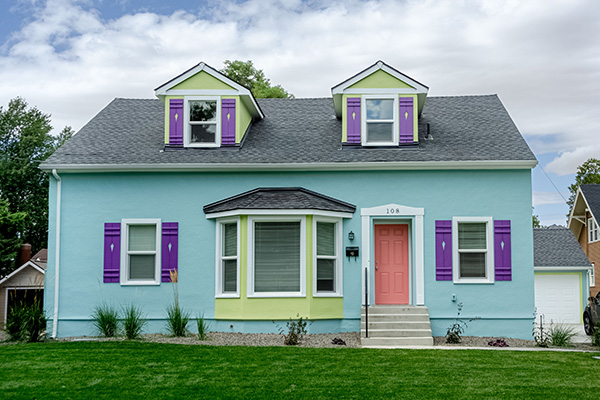
The The Lavender House is focused on providing programming, community building, and learning opportunities for students across campus in regards to LGBTQIA2S+ communities, identities and experiences. This interest house comfortably houses 8–10 residents including a resident assistant in a mix of single and double rooms.
More Information
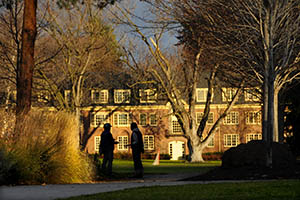
Lyman House is a residence hall with two-room suites that houses nearly 90 first-year students.
Audio Description
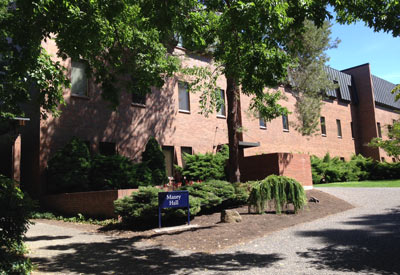
Maxey Hall houses the Division of Social Sciences as well as Maxey Museum and a 350-seat auditorium.
Audio Description
More Information

Completed in 1899, the Memorial Building, also known as “Mem,” is the oldest building on campus and serves as the administrative hub for the college.
Audio Description
More Information
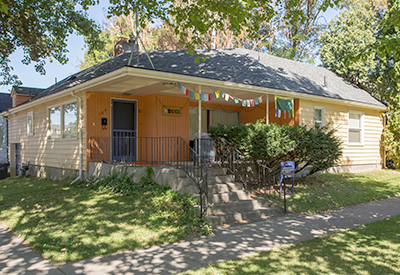
The Multicultural House has four bedrooms and comfortably houses an average of four residents and one resident assistant. This interest house focuses on raising diversity awareness on Whitman’s campus by celebrating and promoting different cultures. The Multicultural House is affiliated with the Glover Alston Intercultural Center and is assigned an adviser from this office.
More Information
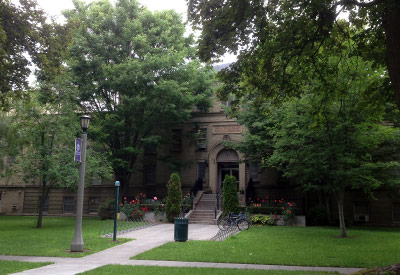
While previously used for housing students, this building is no longer in use by Whitman College.
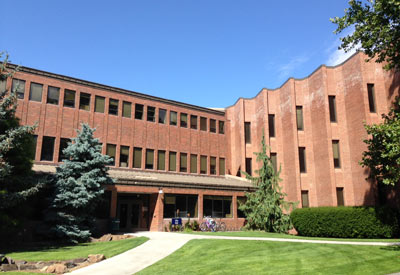
Olin Hall is where most mathematics and humanities classes take place. Olin Hall is also home to the Sheehan Gallery and an auditorium.
Audio Description
More Information
-
- Academic Resource Center
- Art History Department
- Center for Writing and Speaking (COWS)
- Chinese Department
- Classics & Classical Studies Department
- Computer Science Department
- English Department
- French & Francophone Studies Department
- German Studies Department
- Hispanic Studies Department
- Mathematics & Statistics Department
- Philosophy Department
- Religion Department
- Rhetoric, Writing & Public Discourse Department
- South Asian and Middle Eastern Studies
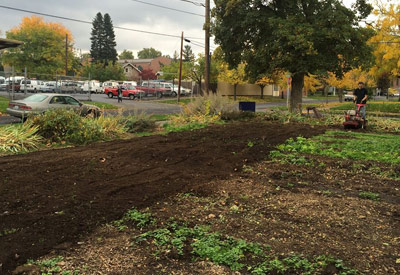
The Whitman Organic Garden, located a short walk from campus, includes a wide variety of annual and perennial vegetables, fruits and herbs. It's also home to a small flock of egg-producing chickens. An ASWC-sponsored club maintains the garden and organizes events to open the space up to everyone.

The Outdoor Tennis Courts are located between the Memorial Building and Maxey Hall. These courts are open all day and available to anyone in the community, with priority given for use by Whitman’s varsity tennis team practices, tennis classes and students.
The Pacific Northwest Regional Observatory located at Braden Farm near Wallula Gap provides Astronomy students the opportunity to use a 30-inch Cassegrain telescope.
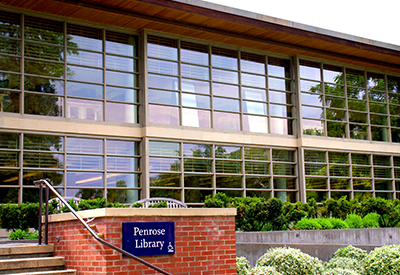
Penrose Library serves as a bridge between the Whitman College community—students, faculty, staff and administration—and the information resources that promote teaching, research and learning. The building is also open to the public.
Audio Description
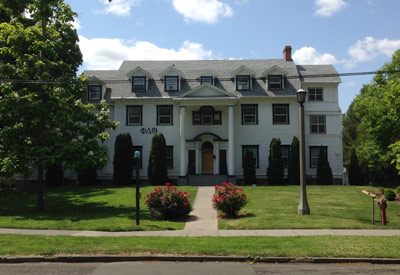
Whitman College’s Washington Beta chapter of Phi Delta Theta was founded on campus in 1915. The chapter house has a dining room, a study room and a recreation hall with a pool table and ping pong table.
More Information
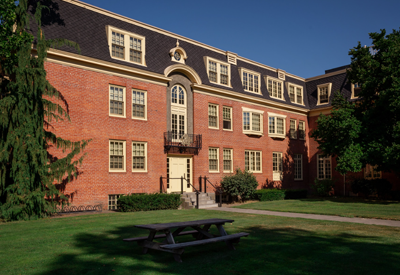
Prentiss Hall houses around 145 female-identifying and gender nonbinary students, including sorority members and new students. Features of the residence hall include a dance room, spirituality room, study rooms and a beautiful main lounge.
Audio Description
More Information
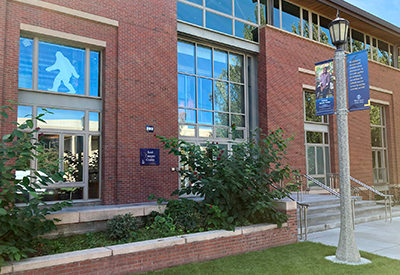
The Reid Campus Center is one of the hubs of campus life.
More Information
- ASWC (Associated Students of Whitman College)
- Campus Post Office
- Career and Community Engagement Center
- KWCW 90.5 FM
- LGBTQIA+ Student Services (and Queer Resource Center)
- Outdoor Program and Rental Shop
- Reid Market
- Religous & Spiritual Life
- Sorority & Fraternity Life
- Stevens Gallery
- Student Clubs & Organizations (Involve)
- Whitman College Book Store
- Whitman Debate and Forensics
- Whitman Events Board (WEB)
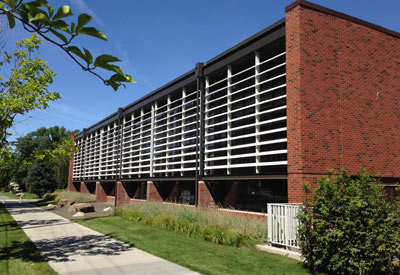
The Sherwood Athletic Center features a main gym, a multipurpose use space, racquetball courts and more. The 71,000-square-foot center also has an indoor Climbing Center, team locker room space for Varsity Athletics, and modern athletic training room facilities.
Audio Description
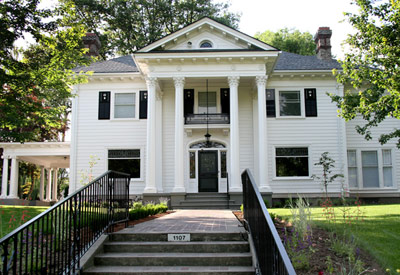
Built in 1922, Sherwood House has served as the residence of the President of Whitman College since 1995.
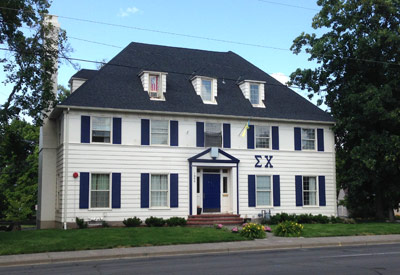
Whitman College’s Gamma Epsilon chapter of Sigma Chi was founded on campus in 1923.
More Information
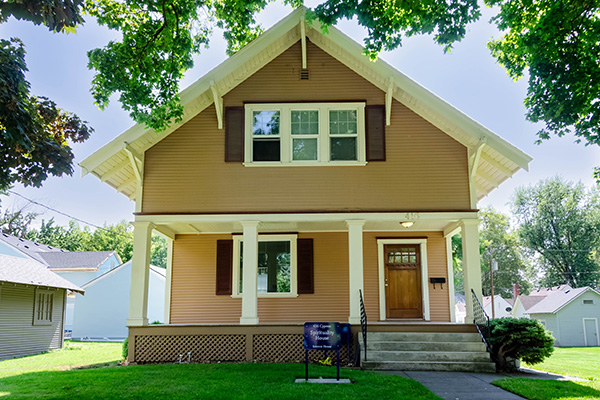
The Spirituality House is a three-bedroom house that can house an average of four students. Students living in this interest house have the opportunity to live out the fullness of their religious, cultural, spiritual, moral, and philosophical traditions/explorations in relationship with others. The Spirituality House is affiliated with the Office of Religious and Spiritual Life.
More Information
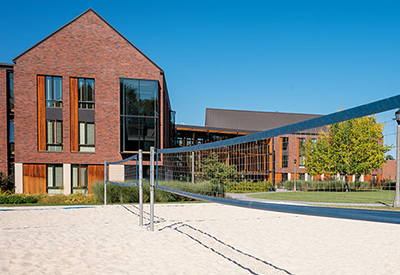
Stanton Hall is a residence hall that houses 150 sophomore students, with single and shared room, outdoor fire pit, a large lounge and shared kitchen spaces.
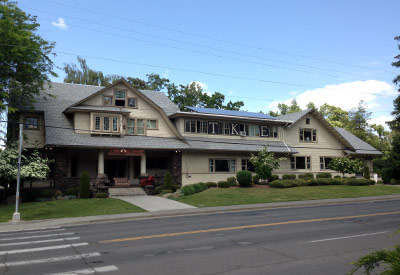
Whitman College’s Alpha Theta chapter of the Tau Kappa Epsilon fraternity was founded on campus in 1930.
More Information
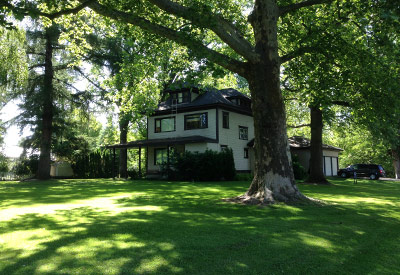
The Tekisuijuku (滴水塾) is a residential interest house that serves as a home for an average of five students interested in speaking Japanese and learning more about Japanese culture.
More Information
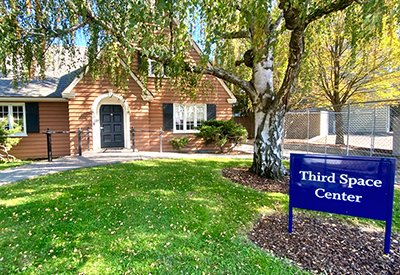
The Third Space Center celebrates and supports communities of color, offering a safe, affirming space for students to express their identities. It features a welcoming community room, salon, dining space and kitchen on the first floor and an adaptable second floor for student use. Designed in collaboration with students, staff, faculty and the Confederated Tribes of the Umatilla Indian Reservation, the center fosters inclusion and cultural connection on campus.
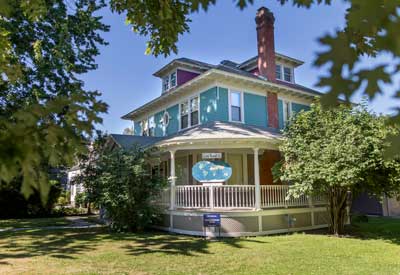
The Wellness House has four bedrooms and houses an average of five residents and one resident assistant. Residents of this interest house focus on raising campus awareness about world issues such as hunger, population, and human rights.
More Information
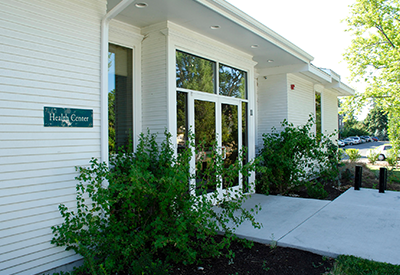
The Welty Student Health Center is a small, nurse-managed clinic for routine illness and injury.
More Information
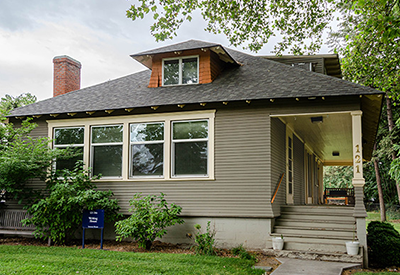
The Writing House provides a strong creative atmosphere for students to live together and improve their writing abilities. The house has four bedrooms with space for an average of six residents and one resident assistant. The Writing House is assigned an adviser from the English Department.
More Information
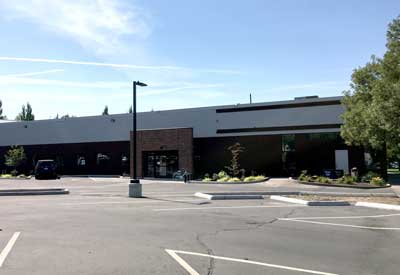
The Whitman Technology Services Building is home to the offices of Conferences, Events & Scheduling, Environmental Health and Safety and Technology Services.
